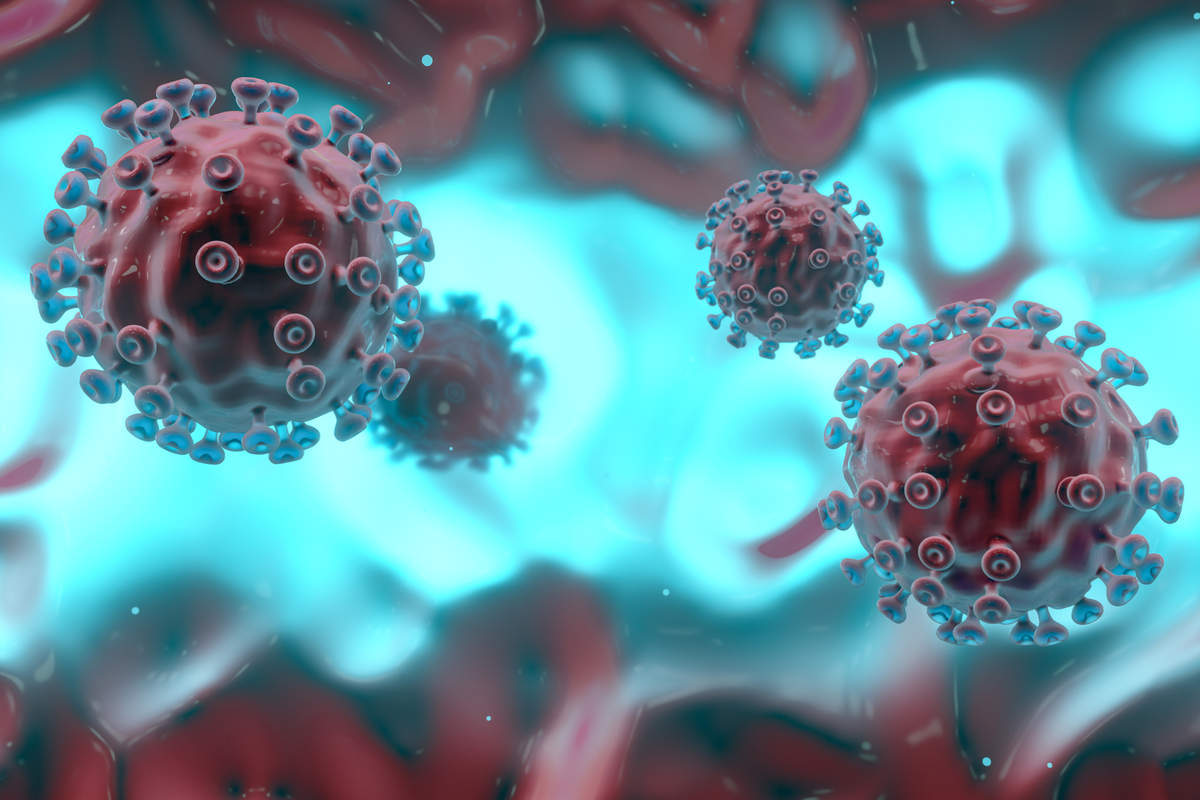It is known that SARS-COV 2 colonizes the gastrointestinal tract, replicates actively, and even persists for a long time with passage into the bloodstream, which may explain the long COVID. The correction of vitamin D deficiency could have a major protective role.
SARS-CoV-2 has been detected in the gastrointestinal tract for prolonged periods. The intestinal barrier plays a central role in the events leading from SARS-CoV-2 infection to severe complications. The most recent studies suggest that SARS-CoV-2 disrupts the integrity of the intestinal biological, mechanical, and immunological barrier. The diversity of the microbiota and the population of beneficial bacteria are reduced, along with the proliferation of pathogenic bacteria (dysbiosis).
Pre-existing dysfunction amplified by SARS-COV-2
The spaces between intestinal cells, the tight junctions (TJs), play an essential role as a waterproof barrier. If this intestinal barrier is dysfunctional, the passage of bacteria, fungi and endotoxins into the circulation is possible. A pre-existing alteration of the intestinal barrier found in patients with comorbidities (cardiovascular diseases, obesity, diabetes and immunosuppression) favors this deleterious passage and makes them more vulnerable [1]. The team of Prof. C. Devaux (CNRS – Marseille) has shown that in patients with intestinal SARS-CoV-2, the virus can trigger damage to the barrier by disrupting these tight junctions, thus contributing to the overall gastrointestinal symptoms of COVID-19 [2].
Long COVID: prolonged digestive presence of SARS-COV2 and circulating spike
Without any viral particles in the respiratory tract, 12.7% of patients had SARS-CoV-2 in the stool at 120 days and 3.8% were still shedding SARS-CoV-2 at 210 days [3]. In addition, viable virus was found in the appendix of 2 patients with long Covid symptoms at D + 175 and D + 462 days. This is the first study to detect viable virus for such a long time in the gastrointestinal tract [4].
In addition, on 31 patients with long COVID, the researchers were able, via ultrasensitive technology (Simoa), to identify in circulation in the blood, either the spike protein, the N nucleocapsid or the S1 subunit in about 65% of long COVID patients several months later. The authors suggest the presence of a persistent active viral reservoir of SARS-CoV-2 at the origin of their discovery [5].
Zonulin, a marker of altered intestinal permeability
Zonulin is a molecule that alters the tightness of the intestine, by opening the tight junctions that join the cells of the wall. Produced in excess, it can cause the passage of undesirable compounds into the body.
As of July 2021, a team identifies zonulin as a marker and potential therapeutic target in the multisystem inflammatory syndrome (MIS-C or PIMS) that affects children [6].
One study showed that in the MIS-C group, compared to a control group, zonulin was significantly higher. Zonulin opens the tight junctions (TJs) and allows the passage of highly pro-inflammatory viral particles into the circulation, but also of endotoxins or lipopolysaccharides (LPS) of bacterial origin from the digestive tract. These results indicate that increased intestinal permeability may be involved in explaining severe COVID infection and MIS-C disease in children [7].
An inflammatory bomb in the digestive tract

Pierre Sonigo, former INSERM research director and virus specialist, believes that “there is nothing more pro-inflammatory in the body than the endotoxins (LPS) of the bacterial wall”. He notes that “we all have a potential inflammatory bomb in the digestive tract. When intestinal permeability increases, a phenomenon called LPS translocation can occur. The permeability increases a lot in case of digestive infection. All this is unfortunately frequent in case of COVID. Digestive manifestations are also known to increase the risk of severe COVID with shock.
A hope for treatment in children with C-ISD
In children with MIS-C, the prolonged presence of SARS-CoV-2 in the gastrointestinal tract led to the release of zonulin with passage of SARS-CoV-2 antigens into the bloodstream, resulting in hyperinflammation, according to a team at Massachusetts General Hospital. Larazotide, a zonulin inhibitor used in the treatment of celiac disease, would prevent the alteration of digestive permeability (tight junctions = TJ), limiting the passage of deleterious antigens: this treatment would be well tolerated and useful as an adjuvant treatment. Thus, 4 young MIS-C patients treated with larazotide had a decrease in Spike protein levels to undetectable levels, a faster improvement of gastrointestinal symptoms and a tendency to reduce the length of hospital stay [8].
What about vitamin D?
Vitamin D is known to be involved in inflammatory bowel disease and is involved in intestinal tight junction permeability.
Since 2007, experimental studies have shown that vitamin D3 may play a protective role in the mucosal barrier by maintaining the integrity of junctional complexes and in the healing capacity of the colonic epithelium [9].
Vitamin D levels are also inversely correlated with symptom score and fecal zonulin. These data highlight the close relationship between Vitamin D and the intestinal barrier [10].
Plasma endotoxin and zonulin decreased with increasing vitamin D levels. Analyses showed a significant association between plasma zonulin levels and vitamin D levels. This finding again suggests a relationship between vitamin D deficiency and early alterations in intestinal permeability. Thus, assessment of vitamin D levels and preventive correction of deficiency may be warranted [11].
Both in vitro and in vivo, another study shows that vitamin D3 attenuated the increase in intestinal mucosal permeability. Finally, vitamin D3 treatment significantly decreased the levels of zonulin release [12].
Experimentally in mice with a vitamin D deficient diet, a team observed a significant decrease in the thickness of the colonic mucosa, a marked increase in the levels of pro-inflammatory cytokines, and high levels of zonulin-1. Vitamin D supplementation could be part of a therapeutic strategy for human diseases involving leaky gut according to the authors [13].
Severe vitamin D deficiency and MIS-C
Finally, out of 31 young patients with MIS-C, 10 had severe vitamin D deficiency with a mean level of 7.2 ng/ml (the desirable level is above 30ng/ml, or even 50 ng/ml). 90% with severe vitamin D deficiency had severe disease and an increased risk of cardiac damage [14]. The preventive effect of vitamin D was suggested in March 2021 in a mini-review of the scientific literature [15].
All of these data suggest that altered digestive permeability concomitant with penetration and the presence of digestive replicative virus are instrumental in understanding COVID – long COVID and MIS-C. Further studies and clinical trials are needed to determine the therapeutic impact of larazotide on the prevention of MIS-C, and correction of vitamin D deficiency on severe COVID and long COVID.
- Bibliographie
1) Assimakopoulos : SARS CoV-2-Induced Viral Sepsis: The Role of Gut Barrier Dysfunction. Microorganisms 2022, 10, 1050. https://doi.org/10.3390/microorganisms10051050 - 2) Osman IO, Devaux CA : Control of CDH1/E-Cadherin Gene Expression and Release of a Soluble Form of E-Cadherin in SARS-CoV-2 Infected Caco-2 Intestinal Cells: Physiopathological Consequences for the Intestinal Forms of COVID-19. Front Cell Infect Microbiol. 2022 May 4;12:798767. doi: 10.3389/fcimb.2022.798767.
- 3) Rubin R. : SARS-CoV-2 RNA Can Persist in Stool Months After Respiratory Tract Clears Virus. JAMA. 2022;327(22):2175–2176. doi:10.1001/jama.2022.7892
- 4) Goh, D. et al. Persistence of residual SARS-CoV-2 viral antigen and RNA in tissues of patients with long COVID-19 (jun 2022) Researchgate DOI : 10.21203/rs.3.rs-1379777/v2
- 5) Zoe Swank et al.: Persistent circulating SARS-CoV-2 spike is associated with post-acute COVID-19 sequelae medRxiv 2022.06.14.22276401;
- 6) Hensley-McBain T et al. Zonulin as a biomarker and potential therapeutic target in multisystem inflammatory syndrome in children. J Clin Invest. 2021 Jul 15;131(14):e151467. doi: 10.1172/JCI151467. PMID: 34160366; PMCID: PMC8279574.
- 7) Kılıç AO et al. Zonulin and claudin-5 levels in multisystem inflammatory syndrome and SARS-CoV-2 infection in children. J Paediatr Child Health. 2022 May 30. doi: 10.1111/jpc.16033. Epub ahead of print. PMID: 35638118.
- 8) Yonker LM, Swank Z, Gilboa T, Senussi Y, Kenyon V, Papadakis L, Boribong BP, Carroll RW, Walt DR, Fasano A. Zonulin Antagonist, Larazotide (AT1001), As an Adjuvant Treatment for Multisystem Inflammatory Syndrome in Children: A Case Series. Crit Care Explor. 2022 Feb 18;10(2):e0641. doi: 10.1097/CCE.0000000000000641. PMID: 35211683; PMCID: PMC8860335.
- 9) Zhao H, et al. : Protective role of 1,25(OH)2 vitamin D3 in the mucosal injury and epithelial barrier disruption in DSS-induced acute colitis in mice. BMC Gastroenterol. 2012 May 30;12:57. doi: 10.1186/1471-230X-12-57. PMID: 22647055; PMCID: PMC3464614.
- 10) Linsalata M, et al The Relationship between Low Serum Vitamin D Levels and Altered Intestinal Barrier Function in Patients with IBS Diarrhoea Undergoing a Long-Term Low-FODMAP Diet: Novel Observations from a Clinical Trial. Nutrients. 2021 Mar 21;13(3):1011. doi: 10.3390/nu13031011.
- 11) Eslamian G, et al. Association of intestinal permeability with admission vitamin D deficiency in patients who are critically ill. J Investig Med. 2020 Feb;68(2):397-402. doi: 10.1136/jim-2019-001132. Epub 2019 Oct 30
- 12) Dong S e al. : Protective Effect of 1,25-Dihydroxy Vitamin D3 on Pepsin-Trypsin-Resistant Gliadin-Induced Tight Junction Injuries. Dig Dis Sci. 2018 Jan;63(1):92-104. doi: 10.1007/s10620-017-4738-0. Epub 2017 Sep 4. PMID: 28871457
- 13) Yeung CY, et al :. Effects of Vitamin D-Deficient Diet on Intestinal Epithelial Integrity and Zonulin Expression in a C57BL/6 Mouse Model. Front Med (Lausanne). 2021 Aug 3;8:649818. doi: 10.3389/fmed.2021.649818.
- 14) Torpoco-Rivera D : Vitamin D and morbidity in children with multisystem inflammatory syndrome related to Covid-19. Prog Pediatr Cardiol. 2022 Mar 1:101507. doi: 10.1016/j.ppedcard.2022.101507.
- 15) Feketea G, et al . : Vitamin D in Corona Virus Disease 2019 (COVID-19) Related Multisystem Inflammatory Syndrome in Children (MIS-C). Front Immunol. 2021 Mar 8;12:648546. doi: 10.3389/fimmu.2021.648546.

